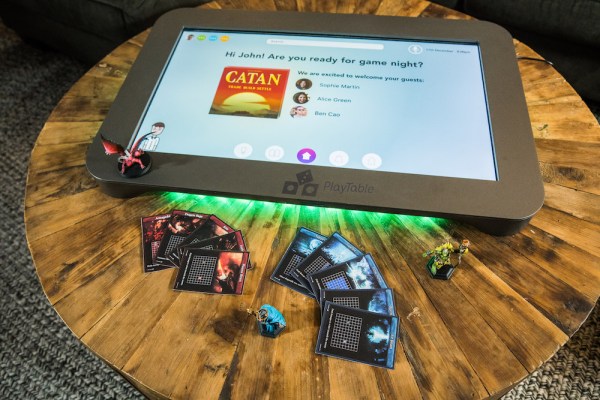
Blok.Party, the company that built the upcoming PlayTable game console, announced today it raised $10 million in new funding. It’s also unveiling a big content partnership, where Blok.Party will create its own version of the popular board game Settlers of Catan.
I first wrote about Blok.Party and PlayTable earlier this year, when co-founder and CEO Jimmy Chen first laid out his vision to use blockchain technology to build a console that can recognize real-world objects (like figurines and cards), creating a hybrid between tabletop and video gaming.
The idea may have sounded a little abstract at the time, but it got a lot clearer when Chen dropped by the TechCrunch New York office to play a couple rounds of Catan with me.
I’ll admit that I hadn’t played in a while, but it was clear from the start that PlayTable saved us some setup time — instead of putting all the pieces of the physical board together, you play on a digital representation of the board. Most of the pieces are digitized too, and we used and traded our cards using smartphones. But there is a physical “robber” piece, because Chen said this allows the robber’s movement to remain “a very visceral experience … that a digital version can’t ever capture.”
It may not be too long before you get to try this out for yourself, at least if you’re among the 100,000 pre-orders Blok.Party has received so far. Chen said the company will start shipping its first devices this fall.
[embedded content]
He added that Catan, like many of the other games built for PlayTable, will be priced at around $20.
“For us, it’s not about trying to compete based on price,” Chen said. “We’re trying to compete based on experience.”
The new funding comes from crypto fund JRR Capital and other investors. Chen said the company will use the money to continue scaling the product, including further software development and building out the library of games.
At the same time, he emphasized that although Blok.Party is manufacturing the initial devices, his vision is to achieve real scale through partnerships with hardware manufacturers, who will build their own PlayTable consoles. Apparently, some of those discussions are already underway.
“Our strategy is to always have [our own] hardware program running to continually do research,” Chen said. “What I’ve discovered is that keeping a hardware program running is not that expensive. The expensive part is when you try to scale the program.”
Be the first to comment